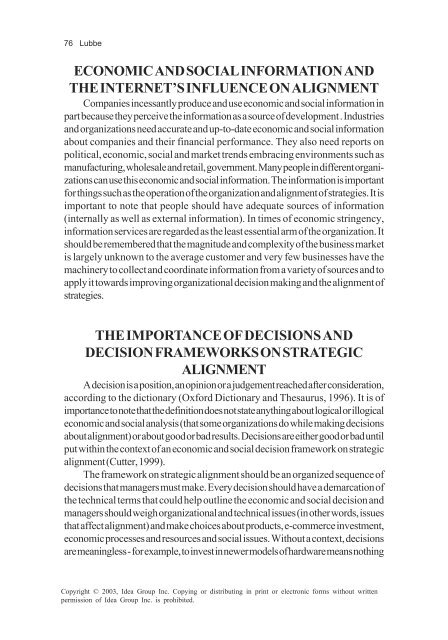www.sharexxx.net - free books & magazines
www.sharexxx.net - free books & magazines
www.sharexxx.net - free books & magazines
Create successful ePaper yourself
Turn your PDF publications into a flip-book with our unique Google optimized e-Paper software.
76 Lubbe<br />
ECONOMIC AND SOCIAL INFORMATION AND<br />
THE INTERNET’S INFLUENCE ON ALIGNMENT<br />
Companies incessantly produce and use economic and social information in<br />
part because they perceive the information as a source of development . Industries<br />
and organizations need accurate and up-to-date economic and social information<br />
about companies and their financial performance. They also need reports on<br />
political, economic, social and market trends embracing environments such as<br />
manufacturing, wholesale and retail, government. Many people in different organizations<br />
can use this economic and social information. The information is important<br />
for things such as the operation of the organization and alignment of strategies. It is<br />
important to note that people should have adequate sources of information<br />
(internally as well as external information). In times of economic stringency,<br />
information services are regarded as the least essential arm of the organization. It<br />
should be remembered that the magnitude and complexity of the business market<br />
is largely unknown to the average customer and very few businesses have the<br />
machinery to collect and coordinate information from a variety of sources and to<br />
apply it towards improving organizational decision making and the alignment of<br />
strategies.<br />
THE IMPORTANCE OF DECISIONS AND<br />
DECISION FRAMEWORKS ON STRATEGIC<br />
ALIGNMENT<br />
A decision is a position, an opinion or a judgement reached after consideration,<br />
according to the dictionary (Oxford Dictionary and Thesaurus, 1996). It is of<br />
importance to note that the definition does not state anything about logical or illogical<br />
economic and social analysis (that some organizations do while making decisions<br />
about alignment) or about good or bad results. Decisions are either good or bad until<br />
put within the context of an economic and social decision framework on strategic<br />
alignment (Cutter, 1999).<br />
The framework on strategic alignment should be an organized sequence of<br />
decisions that managers must make. Every decision should have a demarcation of<br />
the technical terms that could help outline the economic and social decision and<br />
managers should weigh organizational and technical issues (in other words, issues<br />
that affect alignment) and make choices about products, e-commerce investment,<br />
economic processes and resources and social issues. Without a context, decisions<br />
are meaningless - for example, to invest in newer models of hardware means nothing<br />
Copyright © 2003, Idea Group Inc. Copying or distributing in print or electronic forms without written<br />
permission of Idea Group Inc. is prohibited.









